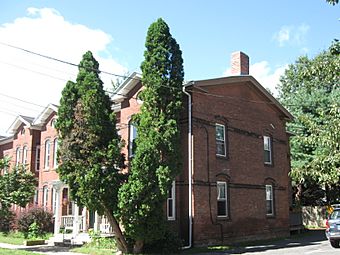Building at 8–22 Graves Avenue facts for kids
Quick facts for kids |
|
|
Building at 8–22 Graves Avenue
|
|
 |
|
| Location | 8–22 Graves Ave., Northampton, Massachusetts |
|---|---|
| Area | 1.6 acres (0.65 ha) |
| Built | 1887 |
| Architectural style | Queen Anne |
| NRHP reference No. | 85002784 |
| Added to NRHP | November 7, 1985 |
The Building at 8–22 Graves Avenue is a historic rowhouse located just outside the main downtown area of Northampton, Massachusetts. A rowhouse is a type of home that shares walls with the houses next to it. This special building was constructed in 1887 for Doctor Silas R. Cooley.
It is built in the beautiful Queen Anne style and made of brick. This was quite unusual for homes in the Connecticut River valley back then. Most houses were not made of brick, and rowhouses were also rare in the area. Because of its unique style and history, the building was added to the National Register of Historic Places in 1985.
What is the Graves Avenue Building?
The Building at 8–22 Graves Avenue is found on Graves Street. This street is a quiet, residential road near downtown Northampton. The building itself is a long row of eight homes connected together.
A Closer Look at its Design
Each home in the row is made of red brick. The units are arranged in pairs that look like mirror images of each other. You can see windows set in rounded arch openings. There are also window sections that stick out from the ground floor.
The entrances to the homes are covered by porches with pointed roofs. Above each unit, there is a pointed roof section with a round window. At the back of the building, each pair of homes shares a section that sticks out. This part was likely used for services like kitchens.
Who Lived Here? A Peek into History
These rowhouses were built around 1887. This was a time when Northampton was growing very quickly. The land where the building stands used to be part of Elisha Graves's property. In 1884, his land was divided into smaller plots, and Graves Avenue was created.
Silas Cooley was the first known owner of the building. He became a very important landowner in the region. This building was one of the first properties he bought. The first people who lived in these homes were working-class families from the city. They included people like a photographer, a milk delivery person, and a telegraph operator.



